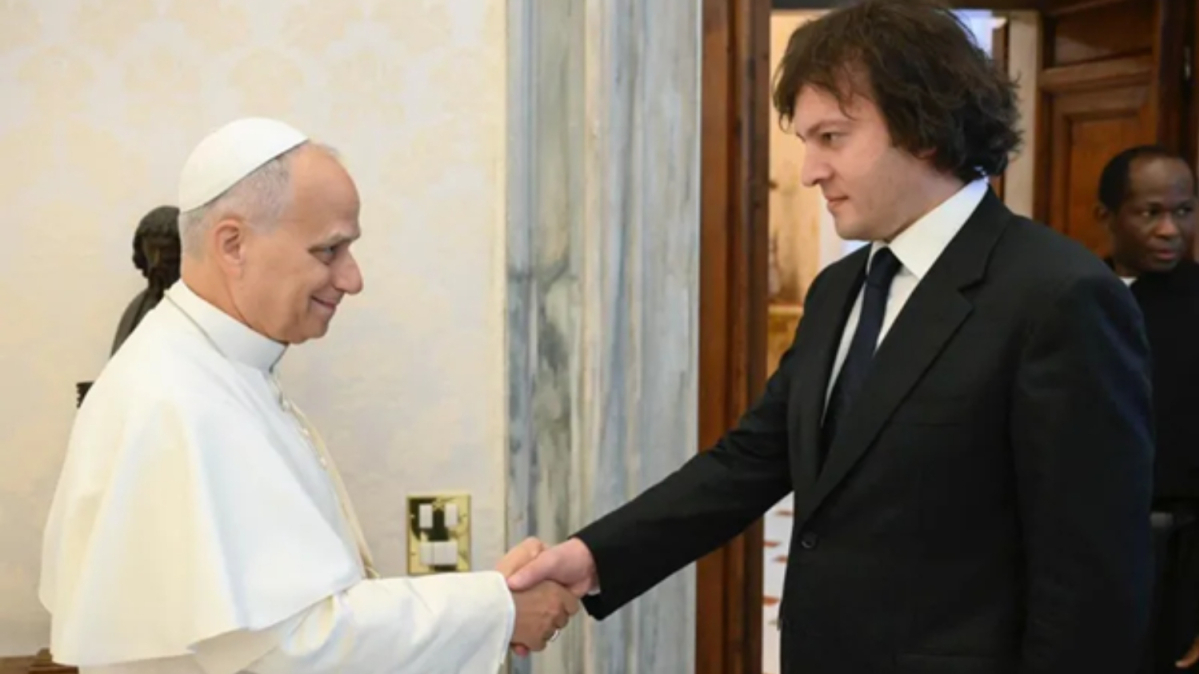U.S. President Trump announces new 10% global tariff after Supreme Court setback
President Donald Trump said on Friday (20 February) he will sign an executive order imposing a new 10% “global tariff” on imports. The development...

Georgia has formally invited Pope Leo XIV to visit Tbilisi in 2026, following Prime Minister Irakli Kobakhidze’s meeting with the Pontiff at the Vatican on Monday 24th November.
The meeting, described by both sides as warm and substantive, marked Kobakhidze’s first audience with the newly elected pontiff.
According to the Georgian government, the two leaders discussed global challenges, humanitarian issues and the situation in Georgia’s occupied regions, ending with an official invitation for the Pope to attend next year’s major national “event”—the commemoration of Georgia’s historic adoption of Christianity.
In 336 AD, Georgia became one of the first nations in the world to adopt Christianity as a state religion, a transformation traditionally attributed to the mission of St. Nino.
The anniversary is more than ceremonial: it marks the foundation of Georgian identity, literature, diplomacy, and statehood.
The 1,700-year milestone scheduled for 2026 is expected to be one of Georgia’s most significant cultural events in decades—one that blends history, religious heritage, and international visibility.
A papal visit during such a symbolic year would carry extraordinary historical weight, as the Vatican and Georgia have maintained diplomatic ties for over three decades despite belonging to different Christian traditions.
The meeting signals Georgia’s intention to highlight its ancient Christian roots at a time when global interest in religious diplomacy is growing. The Vatican’s moral authority and its global influence could give Georgia’s anniversary international prominence.
It also reflects Tbilisi’s strategic communication on the world stage. For years, Georgia has attempted to balance its Euro-Atlantic aspirations with a narrative anchored in cultural conservatism and traditional values.
Extending an invitation to the Pope while emphasising national religious heritage—helps the government project an image of identity-based diplomacy without overtly shifting geopolitical alignments.
In recent years, the Georgian Dream administration has increasingly emphasised themes such as national identity, religious heritage, and conservatism—both domestically and internationally.
However, officials have framed this Vatican visit not as an ideological pivot, but as recognition of Georgia’s historical character and the Vatican’s long-standing support for the country’s sovereignty.
The tone remains measured: Tbilisi is not presenting the Pope’s potential visit as a political endorsement, but rather as a symbolic moment that aligns with Georgia’s cultural narrative.
Whether Pope Leo XIV accepts the invitation will become clear as preparations for next year intensify.
But the message from Tbilisi is unmistakable: Georgia is seeking to mark its Christian anniversary not only as a religious celebration, but as a diplomatic opportunity—global, symbolic, and grounded in the country’s seventeen centuries of Christianity.
A papal visit would be unprecedented in modern Georgian history, and the Vatican meeting was the first step toward that possibility.
Quentin Griffiths, co-founder of online fashion retailer ASOS, has died in Pattaya, Thailand, after falling from the 17th floor of a condominium on 9 February, Thai police confirmed.
The Board of Peace will be "looking over the United Nations," said U.S. President Donald Trump at the inaugural Washington meeting, where representatives from over 20 countries gathered to unveil plans for Gaza’s reconstruction and coordinate international support.
At least four people have died and 17 others were injured after a liquid gas truck overturned and exploded in Santiago, Chile’s capital, authorities confirmed on Thursday. Police said the driver was among those killed.
The Armenian Cabinet has approved a military-technical cooperation agreement (MTC) with Poland, which will be forwarded to parliament for ratification following its signing, according to Armenian media.
Cubans are increasingly turning to solar power to keep businesses operating and basic household appliances running during prolonged electricity cuts, as fuel shortages make diesel generators and other temporary solutions more difficult and costly to maintain.
Iran’s Foreign Minister Abbas Araghchi on Saturday (21 February) dismissed U.S. claims that 32,000 civilians were killed during protests in Iran, saying Tehran has already released official figures and calling for evidence to substantiate higher estimates.
Uzbekistan's president Shavkat Mirziyoyev has held a series of high-level meetings in the U.S. aimed at strengthening bilateral economic and strategic ties between the two countries.
Türkiye has signalled readiness to contribute to a proposed Gaza stabilisation force during the inaugural Board of Peace meeting on Thursday (19 February), but according to former Turkish diplomat Mehmet Öğütçü, the decisive factor will be whether Israel and the United States agree on Ankara’s role.
Türkiye is prepared to contribute troops to a proposed international stabilisation force for Gaza, Turkish Foreign Minister Hakan Fidan said on Thursday.
Iran has warned it will respond “decisively” if subjected to military aggression, saying U.S. President Donald Trump’s rhetoric signals “a real risk of military aggression”.
You can download the AnewZ application from Play Store and the App Store.

What is your opinion on this topic?
Leave the first comment